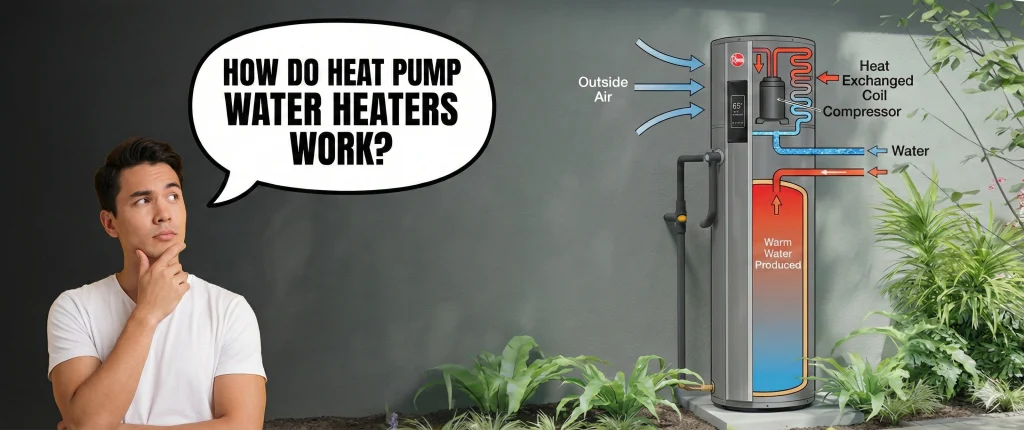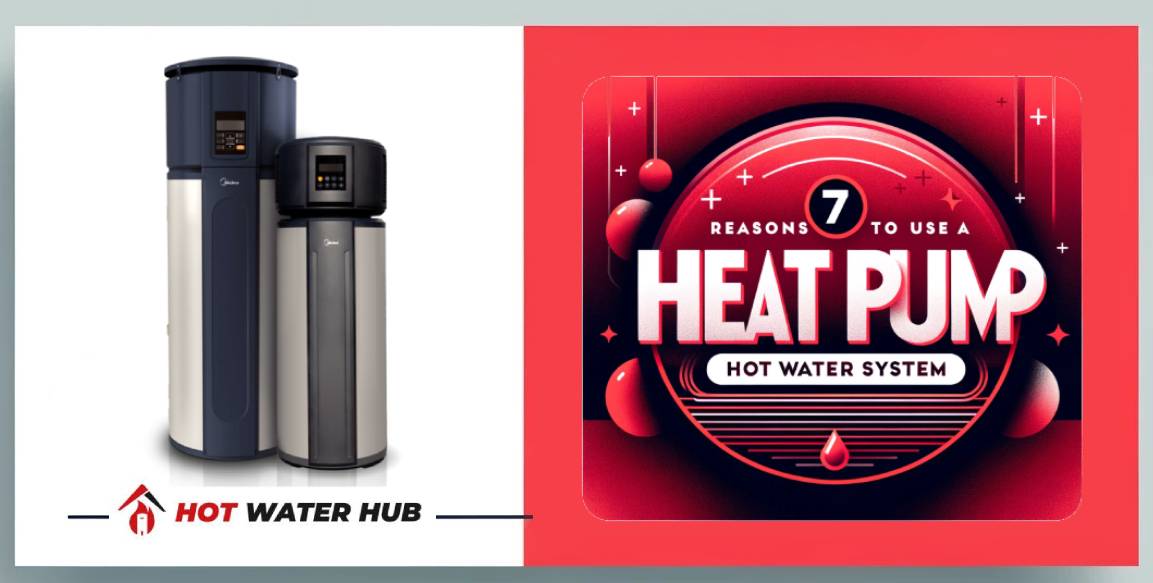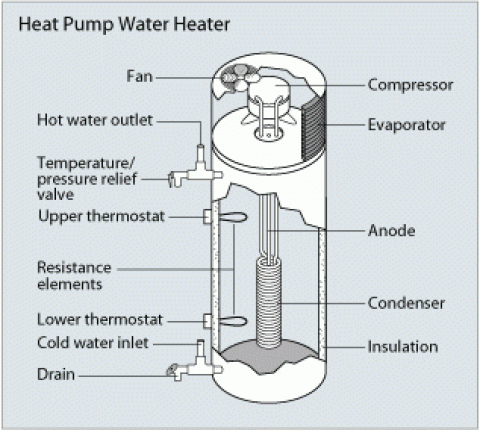
Ever wondered how you can heat your water using the air around you? It might sound like magic, but it’s […]

As energy prices escalate and concerns regarding pollution grow, many Aussies find themselves turning towards heat pump hot water systems because of their attractive features – energy efficiency, affordability, and safety.
According to recent statistics released by Statista, approximately 31,094 Australian homes adopted these innovative heating solutions in 2020.
Fast forward to 2022, witnessing over 87,000 installations, followed closely by another 101,000 units added in 2023, as reported by Clean Energy Regulators.
Currently, this number is set to keep growing with experts saying it could hit more than 450,000 installations in 2036!
But why are homeowners all over Australia switching to heat pump hot water systems?
Good question, and here is every reason you need to know. But first, let us explain the technology behind the system.
A heat pump water system is a water heater that heats water without generating any heat. The system is meant to transfer heat from the surrounding air to heat water. But, how does it do this?
You can think of a heat pump hot water as a refrigerator that functions the opposite way – extracting heat from the air rather than releasing it. The process is made possible by the four main components: the fan, evaporator, refrigerant and compressor.
The heating process begins with the fan drawing in outside air and passing it over the evaporator, which comprises a series of metal tubes. Inside these tubes is the refrigerant, which can easily change from liquid to gas and vice versa depending on temperature.
When the fan passes air over the tubes, the refrigerant absorbs the heat and changes state, becoming a gas.
Next, this warm gas travels through a compressor, which compresses it, increasing its temperature. After heated, the gas continues through a second set of coils submerged within the water storage tank.
Here, the hot gas releases the heat it gained into the adjacent water, raising its temperature considerably.
After giving out heat, the gas condenses to liquid form, eventually returning to the evaporator coil to start the cycle. Meanwhile, the now-warm water rises slowly toward the top of the insulated storage tank, ready for immediate use whenever required.
In this process, less electricity is needed to power the fan and compressor, making heat pump water heaters a highly energy-efficient solution for heating water.
Here is an illustration of how a heat pump hot water system functions.

1. They are Energy-efficient Systems
Heat pump hot water systems use less electricity than regular water heaters.
As stated by the Australian Department of Climate Change, the Environment and Water, heat pump water heaters use just 30% of the energy required by standard electric models. This means you get up to three times the amount of hot water for the same electrical input!
Translating this efficiency into monetary terms, the Australian Renewable Energy Agency (ARENA) says that Australian families can save roughly $350 annually by switching from electric heaters to heat pump water heaters.
Now imagine how much you could save over the entire lifetime of the system!
2. Environmental Sustainability
Another reason to consider heat pumps hot water systems is that they don’t need any fossil fuels to transfer heat. As discussed,, they use less electricity and safer refrigerants compared to traditional heating methods.
This non-reliance on fossil fuel is a huge benefit for the environment.
It means we will no longer need to engage in destructive activities like mining and drilling just to heat water. Consequently, it will be easier to avoid issues like soil erosion, habitat destruction, deforestation, etc.
3. They are classified as clean, Environmentally Friendly Technology
According to data from the International Energy Agency, heat pumps help reduce greenhouse gases by up to 20%.
This is possible considering they don’t directly burn fuel to generate heat – they use less electricity and safe refrigerant to transfer heat.
The refrigerant has a low global warming potential (GWP), close to zero, meaning negligible emissions. This makes Heat pump hot water systems a worthy investment as we aim for a greener planet.
4. They Help You Save on Energy Bills
A heat pump hot water system’s most significant benefit is saving energy. As previously mentioned, a heat pump hot water system moves heat (from air to water) without creating it.
This process uses far less electricity than electric water heaters. The latter rely on traditional electric resistance heating elements, which can consume much more electricity, adding to your bills.
5. They operate quietly
Heat pump hot water systems have another advantage over traditional water heaters: they operate silently. According to Solar Choice, heat pump hot water systems produce sound levels between 35 dB(A) to 55db(A), which is barely audible.
Heat pumps certainly beat electric water heaters, which can produce sizzling, hissing, and crackling sounds that reach up to 67dB(A). They present the best option for residential settings and areas where noise reduction is critical, such as hospitals, academic institutions, etc.
6. They Have Low Maintenance Costs and a Longer Life Span
An additional reason to choose heat pump water heaters is that they need almost no maintenance. The reason for this is because heat pump hot water systems have fewer mechanical components and moving parts than traditional water heaters.
This means the chances for failures or breakdowns are lower. Additionally, no fuel or flames are used in a heat pump water system, so there is no buildup requiring frequent cleaning. This translates to less frequent maintenance required – often just a check per year!
7. You receive Government Rebates and Incentives for using them
The Australian government (both federal and state) actively encourages the adoption of heat pump technology in its endeavour to achieve 0% emissions by 2050 through various rebate incentives.
The rebates are meant to fund a portion of the total costs for purchasing and installing heat pump water systems to make them more affordable to the public. Examples of such rebates in Australia include the following:
So, there you have it – the top seven reasons to install a heat pump hot water system.
The ball is on your side now: Will you install a heat pump hot water system, or will you continue paying huge bills and harming the environment? Please make the responsible choice.